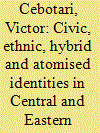| Srl | Item |
| 1 |
ID:
147659


|
|
|
|
|
| Summary/Abstract |
While the topic of identity of ethnic minorities abounds in theoretical insights, most discussion is still clustered around the civic–ethnic divide while assuming conclusions with limited empirical evidence. By contrast, this article uses a four-category typology of identity that considers both in-group and out-group attachments to address hypotheses about competing identities and about factors influencing minorities to adopt one identity type over others. Based on unique data evidence of 12 ethnic minorities in Central and Eastern Europe, this study concludes that the ‘hybrid’ identity, rather than the literature-assumed ‘ethnic’ identity, tops the identification preference of minorities, although there are differences in levels and patterns when controlling for various covariates. The choice of identity depends on the socialisation process, the economic status, the perceived discrimination and intergroup tensions, reflecting variations in the system of values common to a region with complex ethnic dynamics.
|
|
|
|
|
|
|
|
|
|
|
|
|
|
|
|
| 2 |
ID:
153223


|
|
|
|
|
| Summary/Abstract |
Although the Chinese in Kolkata have preserved their Chinese identity, they have been acculturated by various cultural elements from India. It is this mixture of Chinese and Indian practices that gives them a unique cultural identity. When members of this Chinese community in Kolkata and its vicinity emigrated to Toronto or were forcibly deported to China in the aftermath of the 1962 conflict, they carried with them, both knowingly and unknowingly, some of these Chinese-Indian cultural traits. By focusing on the Chinese-Indians living in different geographical and cultural settings, this essay examines the formation of a Chinese-Indian identity in Kolkata and its preservation by some of those who are now residing in Sihui in China and in Toronto, Canada. It also explains some of the main similarities and differences among the three groups of Chinese-Indians. It concludes with an analysis of cultural identity as it manifests among the Chinese-Indian communities.
|
|
|
|
|
|
|
|
|
|
|
|
|
|
|
|